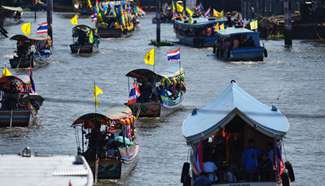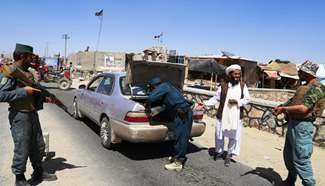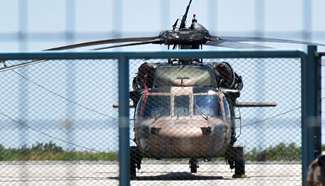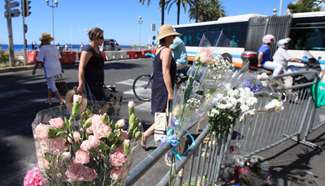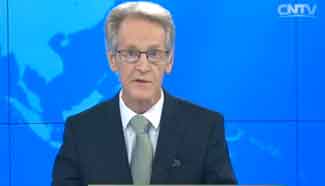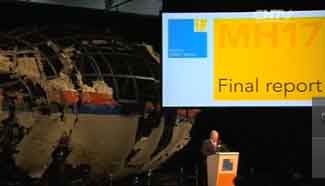TOKYO, July 17 (Xinhua) -- Of the illegal five-member arbitral tribunal on the South China Sea case, except for one designated by the Philippines, four were appointed by Shunji Yanai, former president of the International Tribunal for the Law of the Sea (ITLOS).
Rightist, hawkish, close to Japanese Prime Minister Shinzo Abe, pro-American, unfriendly to China ... these are the tags that people often associate with Yanai.
Observers said it was no strange that The Hague-based tribunal handling the South China Sea arbitration case unilaterally initiated by the former Philippine government issued an ill-founded award on Tuesday and denied China's long-standing historic rights in the South China Sea.
A DIPLOMAT STEPPING DOWN AMID SCANDAL
Yanai came from a diplomatic family in Japan. His father, a graduate from Tokyo University, had worked for the Japanese Foreign Ministry and had been Japan's ambassador to Colombia for a while until he was deported at the start of WWII. He quit the Foreign Ministry and practiced law after the war.
Thanks to his family background, Shunji Yanai went to elementary and middle schools also attended by the Japanese royal family, and was later admitted to Tokyo University to study law. He entered the Japanese Foreign Ministry after graduation, following his father's steps.
The younger Yanai became Japanese ambassador to the United States in 1999.
"As a senior official in the Japanese government Mr. Shunji Yanai is a rare breed. He is ... bold and sometimes controversial, and somehow gets away with things that would most likely cost someone else his career," said Fumiko Halloran in his review of Yanai's book titled "Rapid Changes in Diplomacy."
Yanai had to leave the Foreign Ministry along with three other officials amid a series of embezzlement scandals within the ministry.
After the end of his diplomatic career, Yanai became a professor of law at Chuo University in Tokyo.
A MASTERMIND BEHIND WIDELY OPPOSED SECURITY LAWS
A law graduate from Tokyo University, Yanai was considered by some observers as an expert on bypassing constraints of and warping Japan's postwar pacifist Constitution.
According to Japanese newspaper Nikkei, when Yanai was director general of the Treaties Bureau of the Foreign Ministry during the 1990 Gulf War, he helped push through parliament an act that allowed Japan to send Self-Defense Forces abroad to assist in UN peacekeeping operations. In 1992, the Japanese government dispatched some 600 soldiers and 75 police officers to Cambodia for peacekeeping operations.
In 2007, during Abe's first term as Japanese prime minister, Yanai served as chairman of a panel set up to advise Abe on his plan to revise the country's Constitution to allow military actions overseas.
After Abe took office again in 2012, he relaunched his political agenda of revising the Constitution. It was also Yanai who in 2014 presented a report to Abe advocating lifting the ban on Japan sending its military overseas.
In 2015, Japan abandoned its 70-year pacifism by enacting controversial security laws that allow Japan to dispatch troops overseas to engage in armed conflicts for the first time in seven decades, despite outcries and protests from the public and neighboring countries victimized by Japan's military invasion during World War II.
THE ONE RESPONSIBLE FOR ORGANIZING BIASED ARBITRAL TRIBUNAL
Yanai became the first Japanese to be president of ITLOS on October 1, 2011. His new role raised concerns of countries who had maritime territorial disputes with Japan, including the Republic of Korea.
After the Philippines unilaterally initiated the arbitration case against China in 2013, a five-member arbitral tribunal was created by Yanai.
Due to the maritime conflicts and historical issues between China and Japan, as well as Yanai's political leanings, it is not surprising that Yanai generally chose arbitrators that were biased against China.
In August 2013, when he was still choosing arbitrators, Yanai reportedly stressed on an NHK TV program that Japan's islands are "under threat" and that Japan has "enemies" and needs to improve its military strength for safeguarding security.
"From the result of the arbitration, people can see that it was conducted by a bunch of people who knew very little about the South China Sea issues," said Motofumi Asai, a former official of the Japanese Foreign Ministry in charge of China affairs and a former colleague of Yanai.
Asai also pointed out that Yanai had close ties with Abe, and had served as chairman of an expert panel advising the prime minister on security laws.
"The arbitration was obviously conducted in accordance with the wills of the Abe administration," he said.
For Japanese political analyst Jiro Honzawa, the arbitration is not about truth but about politics. "The Philippines was abetted by the U.S. and Japan to apply for arbitration, because the latter two want to contain China."
He also criticized NHK and some other Japanese media for reporting untruthfully to "cover up for the right-wing administration."
"The arbitration was a trap set up by Japan and the U.S.," he wrote on his blog.



